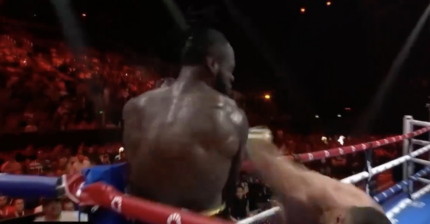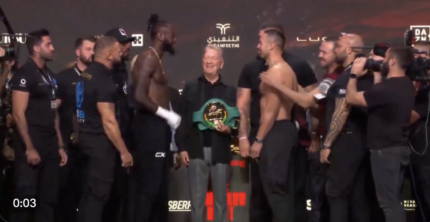Deontay Wilder now has two professional losses in his formerly unblemished career, all to the same man, Tyson Fury.
With popular opinion swaying toward Fury having won all three stanzas of their trilogy, subtle facts chip away at that hypothesis. First, there was the long count by the referee in their first fight in 2018.
Tyson Fury and the sports world reacted to his 11-round KO win over Deontay Wilder 🗣 pic.twitter.com/zy26XJRlI5
— Bleacher Report (@BleacherReport) October 10, 2021
Wilder went through his usual lead-in left and a finishing right that crippled Fury, and he fell like a tree. However, he jumped back up, probably with an additional second of grace by the ref.
That dagger in Wilder’s typical suit of right-handed armor sent him on a path of revelations that the second fight would exacerbate. Wilder knew he was fighting a better man for the first time in his career, and the second fight proved it.
No one had survived a Wilder hard right until Fury, and it was clear that no one had prepared Wilder for that off-chance reality. When Wilder lost the second stanza of the trilogy in the most exposed of fashions, the litany of excuses poured out like an Alabama Roll Tide.
🗣️ "I went over to shake his hand and say well done and he was like 'No, I don't respect you'."
Tyson Fury revealed the exchange of words after knocking out Deontay Wilder in the 11th round in Las Vegas to defend his WBC heavyweight title. pic.twitter.com/qoOUWYrra2
— Sky Sports News (@SkySportsNews) October 10, 2021
First, his then-trainer Mark Breland saved his fighter from the beating he took in the seventh round of the last fight. Had it not been for the gold medalist throwing in that towel, there might have never been a trilogy in the first place.
Wilder actually owes Breland an apology for extending his athletic lifeline with Fury.
Mark Breland posted this after the end of Tyson Fury KO11 Deontay Wilder…
[📽️ Mark Breland] pic.twitter.com/TTtKdF7Axo
— Michael Benson (@MichaelBensonn) October 10, 2021
Then there was the elaborate rig walk outfit that Wilder said slowed his legs down. Or the potential he floated that collusion between Fury trainer Sugarhill Steward and Breland might have mysteriously tainted his in-ring drinking water.
Referee Kenny Bayless received some Wilder criticism from the second fight. Ultimately, Wilder went on a crusade, calling Fury a performance-enhancing drug abuser for the dirty boxing he executed in the second fight.
Tyson Fury says 'there's no more Deontay Wilder' after his dramatic victory last night 😬 pic.twitter.com/O3wbbwcxCc
— DAZN Boxing (@DAZNBoxing) October 10, 2021
It set the stage for Wilder to look defeated morally in the court of public opinion. His ego had been bruised beyond compare because not only had he lost the ‘0’ in the loss column of his record, he made excuses for it.
However, in the trilogy bout, Wilder came out and tried to box Fury as best he could. Because Fury is a much better boxer, Wilder’s body jabs, although practical, were not attached to a full suite of boxing acumen like Fury owns.
But no one can take away Wilder’s heart, which he thought the fated towel in fight No. 2 questioned, and he was right about that.
I give @BronzeBomber credit he fought that fight from the 4th round on nothing but heart because he was dead tired
— Terence Crawford (@terencecrawford) October 10, 2021
After executing a battle that saw him fight through evident fatigue and damage to knock Fury down twice and have a puncher’s chance all night — although Fury was the recipient of yet another longer than usual count on the second knockdown — but Fury always got up.
When it was all said and done, Wilder lay on the canvas, still trying to stay in the fight he had lost. That is why you should respect Deontay Wilder, sore loser and all.
He stayed in the fight all night and had moments of greatness where Fury had to dig deep to not get knocked out.
Deontay Wilder endured serious punishment for large parts of the Tyson Fury trilogy fight last night, but refused to wilt until he physically had nothing left. He may not have covered himself in glory with the excuses, but his performance in the ring proved he's a modern warrior. pic.twitter.com/CFTvQGBMIf
— Michael Benson (@MichaelBensonn) October 10, 2021
“I’m a sportsman,” Fury said. “I went over to show some love and respect, and he didn’t want to show it back. So I pray for him.”
Wilder wouldn’t hug it out after and offered no words to symbolize what the trilogy meant to him, but now the boxing must show what Wilder means to us.
We respect warriors, and Deontay Wilder is nothing short of that. A loss is a loss, but a valiant loss is always a win. Wilder knows Tyson Fury is the best heavyweight boxer globally, but we also know that Wilder is the second-best, certified by staying in when he was already out.



